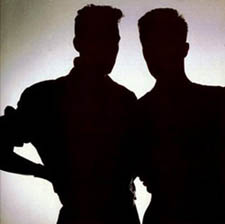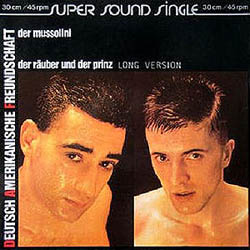Für Immer: Deutsch-Amerikanische Freundschaft and Neue Deutsche Welle
Published on March 30th, 2009 in: Issues, Music, Retrovirus |By Emily Carney
In the late 1970s, post-punk music in Düsseldorf, Germany began to mutate into sounds which were original, energetic, and exciting. Fired up by the music coming from England (and somewhat inspired by more electronic sounds, like Düsseldorf’s own Kraftwerk), one band called Deutsch-Amerikanische Freundschaft (DAF) began to synthesize a sound which wasn’t quite rock, wasn’t quite disco, but was innovative and unusual enough to earn them the future sobriquet as the “fathers of EBM” (electronic body music). DAF were the central figures in the musical Neue Deutsche Welle movement (German New Wave, or simply abbreviated as NDW).

DAF, Für Immer (1982)
In the book Rip It Up And Start Again by Simon Reynolds, Mute Records’ founder Daniel Miller was quoted as saying, “[DAF] weren’t relying on past rock traditions at all, which is the criterion of what goes on Mute” (1). Mute was also known for having a roster encompassing the gleeful synth-pop of Depeche Mode, and the sometimes bloody, always entertaining performance art of Fad Gadget (otherwise known as Frank Tovey).
In Reynolds’ book, DAF singer Gabi Delgado railed against what he called “Anglo-American pop imperialism” (2). The band refused to sound like a conventional Western rock band, with a bassist, singer, guitarist, and all of those expected trappings. While DAF’s music contained synthesizers, the commanding vocals of Delgado combined with drummer Robert Görl’s synth bleeps and muscular drumming created a sound that would incite any dancefloor to riot. DAF’s first album, 1980’s Die Kleinen und Die Bösen (made with several other musicians, as well as Delgado and Görl) has been characterized as sounding like Devo, with its fractured sound and intermittent synth sounds. When the group transformed into the duo of Delgado and Görl, the result was the seminal 1981 album Alles Ist Gut (translated to “all is good”), which made the band pop stars in Germany.

Their fame did come with a fair amount of controversy. The song “Der Mussolini” invoked the names of Jesus Christ, Adolf Hitler, and, of course, Mussolini. Many misinterpreted this song as being somehow “Nazi-like,” very much how Joy Division were misinterpreted as being “neo-fascists” because of the origins of their name. However, the song was an attempt to put names of various historical idols and villains into a sort of pop-culture oriented, disco, Dadaist context. And the song does certainly make you want to get up and dance. Another song on Alles Ist Gut, “Der Räuber und Der Prinz”, turned the old folk tale about the robber and the prince into something completely homoerotic and villainous-sounding. The band explored many taboos about sexual roles in pop culture with this album, and still managed to keep the music eminently danceable.
Simon Reynolds’ book also underscores the hidden romance within DAF’s 1981 album, Gold und Liebe (“Gold and Love”): “[Gold und Liebe] touched on an alchemical theme, the notion that instead of chasing the profane gold of material wealth, the true quest is for gold of the spirit” (3). These themes were clearly on display in songs like “Liebe auf den ersten Blick” and “Verschwende deine Jugend.” DAF’s music advocated that one should fully enjoy being young and beautiful, and love should make you somehow “crazy” and perhaps a bit vulnerable. DAF’s next offering, 1982’s Für Immer (“Forever”), takes this theme even further with songs like “Verlieb’ Dich im mich” (“Fall in love with me”) and “Prinzessin,” a gorgeous song which is as close to a love song as DAF ever got.
After a break in which both Delgado and Görl released solo albums (I am convinced Görl’s album Night Full of Tension is one of the best early-1980s synth records, and the song “Darling Don’t Leave Me” attests to my belief), DAF released a record called “Brothers” in 1985 which audibly showed a much different side of the duo. The song presaged house music by a few years, and would have fit right in at a dance club. The accompanying album First Step to Heaven further extended the sonic theme of “Brothers.”
Pages: 1 2
4 Responses to “Für Immer: Deutsch-Amerikanische Freundschaft and Neue Deutsche Welle”
April 1st, 2009 at 3:43 pm
Great minds think alike.
LLM
April 16th, 2009 at 9:56 pm
I’m newly obsessed with NDW, so excited to read this article and follow some new leads! I think Fehlfarben is my favorite scene band so far, but DAF is surely a close second.
What was wrong with the Telex Eurovision performance? From your introduction, I was waiting for something to catch on fire!
April 18th, 2009 at 2:26 am
I loved Telex at Eurovision, they were just a bit sedated which happens with all of their performances…fire would have been hilarious though.
November 23rd, 2009 at 1:04 pm
[…] Our article on the Neue Deutsche Welle music movement can be found here. […]
Time limit is exhausted. Please reload the CAPTCHA.